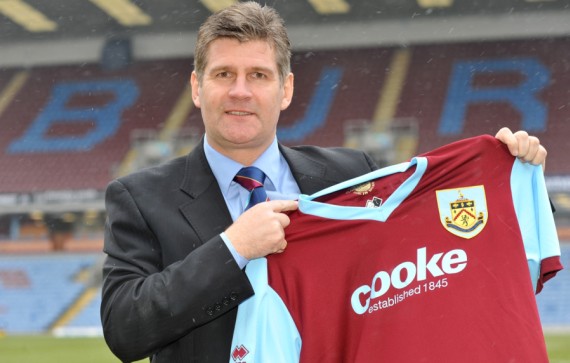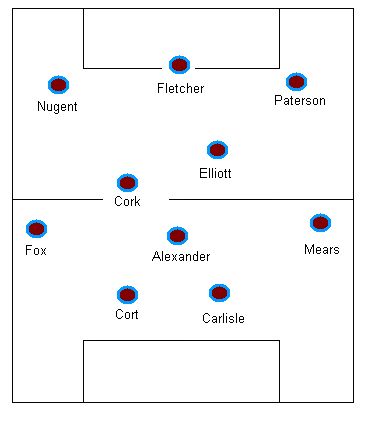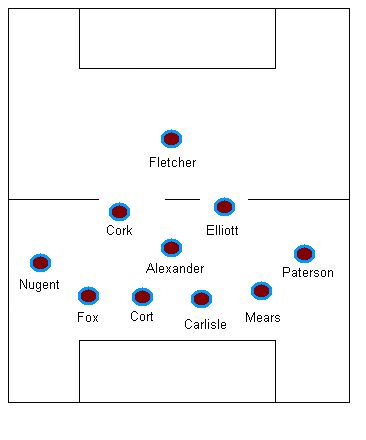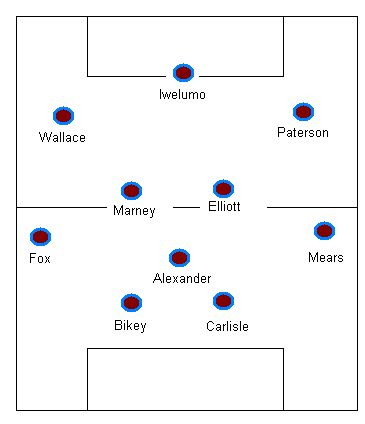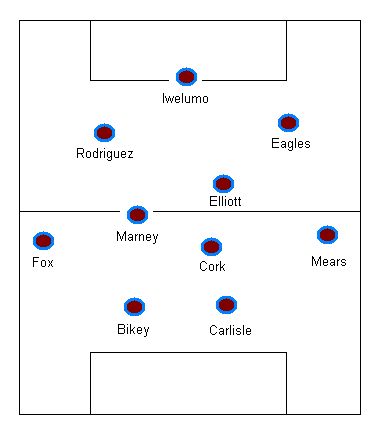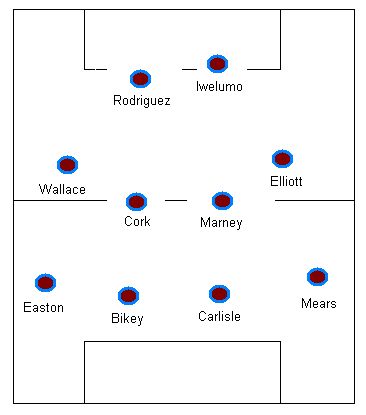|
Perhaps it's a bit of an understatement to say that Brian Laws was under pressure from the start of his spell as Burnley manager. He was immediately labelled as the 'cheap option' by the fans; a theory seemingly supported by the board's bizarre use of a Deloitte and Touche report declaring Brian Laws as the best pound for pound (sterling that is) manager in the Championship to justify the appointment despite his recent sacking at struggling (and eventually relegated) Sheffield Wednesday. Laws was also following the most successful and popular manager the Clarets had seen in a generation in Owen Coyle and the timing of his appointment dictated that he had less than two weeks to assess the squad, bring in a complete back room team and utilise the transfer window.
A big ask but there were positives: Burnley had made a bright start to their first ever Premier League season gathering vital points from early wins against Everton, relegation rivals Hull and Birmingham, mid-table Sunderland and even a high profile initial home victory over Manchester United but wins were fast turning into draws at home and away form was non-existent. Another positive was the confidence of the players and supporters following promotion (at least before Coyle's departure) and despite a thin squad (exacerbated by the loss of the influential Chris McCann to a knee injury) lacking Premier League experience there were a number of talented players at the club with Fletcher, Nugent, Mears and Bikey all impressing at the start of the season.
Laws also had history with the club starting his career at Burnley as a player and having been married in the town. This history and his obvious emotional attachment to the club must have impressed the board and certainly allowed Laws at least a little room to manoeuvre with the fans despite obvious suspicions amongst supporters about his managerial record and capability.
Assessing the squad
Laws' early period as manager was characterised by continuity. This is understandable given that the club had been doing well but the 4-4-2 system the team had been playing had only recently been adopted for the Bolton and Everton games mainly due to injuries and suspensions and it didn't suit the side with the team lacking bite and mobility in the middle of the pitch. Before his departure Coyle had clearly highlighted this midfield area as the key region to strengthen in the transfer window and had lined up moves for Arsenal's impressive teenager Jack Wilshere, Manchester City's Vladimir Weiss and US international Stuart Holden (all three eventually followed Coyle to Bolton fuelling the fires of conspiracy).
Laws also strengthened in midfield bringing in the impressive England U-21 international Jack Cork on loan from Chelsea but seemed to pin point defence as the vital area for improvement spending the majority of his January budget on the functional Leon Cort from Stoke and in ending left-back Danny Fox's unsuccessful period at Celtic. This was a logical assessment given a glance at the Clarets' goals against column but this doesn't tell the full story.
Coyle's time at Burnley had been typified by an expansive attacking game with full backs encouraged forward at every opportunity and the team attacking positively in numbers. It was a huge hit with the fans and brought success but it lead to a number of high scoring games, particularly away including a 5-3 defeat at Upton Park and a 3-3 draw at Manchester City. Arguably the club's best defender, Cameroon international Andre Bikey was also being played in midfield due to the combined problems of Chris McCann's injury, the inexperience of Kevin McDonald and Joey Gudjonsson's unfortunate but obvious inability to step up to the demands of Premier League football.
Had Laws' been given more time to assess the squad he may have decided to strengthen more in midfield and move Bikey back into central defence (a view supported by the manager's signing of Dean Marney and Bikey's return to central defence the following season) but we will never know for sure and in the end Bikey's midfield form faltered and arguably the club's best defender was left out of the side for much of Laws' Premier League reign.
Making his mark
Once Laws got to grips with his squad he eventually settled on a 4-3-3 (see diagram below) with Nugent and either Paterson or Eagles pushed high up in the attacking phase to support Fletcher and provide a direct counter attacking threat down the channels whilst dropping in to form a midfield five when out of possession. The midfield functioned similarly to Coyle's with Alexander holding, Cork or McDonald performing the box to box role and Elliott as the attacking playmaker. Laws' fullbacks were much more restricted than under Coyle (something which led to a clear dip in form for Mears) and the team generally defended much narrower with a more rigid team structure hoping to congest the middle of the pitch.
|
Laws was somewhat harshly tagged as a long-ball manager early on in his reign partly down to a confirmation bias on the part of supporters but also due to a number of clear tactical changes made by the manager. Instead of being a largely free-form attacking team as Burnley had been under Coyle, Laws preferred to maintain shape and to defend deep and narrowly in numbers to counter the team's lack of defensive quality and pace before launching opportunistic and direct counter attacks to exploit the mobility and directness of Nugent and Paterson (a noticeable feature of Brian Laws' Burnley side towards the end of this season was to employ a deep back line of six players with the defence extremely narrow and the wide forward players tucked into the full back positions (see diagram below).
|
Laws himself stated upon his appointment as Burnley manager that he prefers his teams "to get the ball down and play good football" and the players did still noticeably look to be creative and keep the ball grounded; a policy which must have had the appeasement of the fans in mind but was also necessitated by the lack of physicality in the squad and the positive technical attributes of key players such as Fletcher and Elliott. 'Good football' however, is subjective and the side clearly looked to get the ball forward much earlier and committed less men forward than under Owen Coyle. In addition the move to a more direct counter attacking game led to fans favourite Robbie Blake losing his place in the side. Blake's obvious flair did little to cover up the lack of pace in a player coming towards the end of his career and this didn't suit the team's adapted game plan and this certainly contributed to Laws' perceived negative football. Few neutral fans would recognise this as 'long ball' football but Burnley supporters had gotten used to Coyle's philosophy and were, perhaps understandably, less than impressed with Laws' pragmatism and reputation.
2009/2010 season conclusion
Despite improved away performances (Manchester United, Hull and Wigan in particular) and a truly marvellous 4-2 final day victory over 4th placed Tottenham, it was too little too late and unfortunately the club lost all its key games versus relegation rivals Portsmouth, Wolves and Wigan (as well as an unforgiveable dispassionate defeat at home to rivals Blackburn Rovers) in the season run in and were relegated before the end of the campaign. In these games the team simply seemed to lack the required fight or belief to survive and in general there was an air of negativity, inevitability, nihilism and anger around Burnley despite the club's well intentioned and enthusiastic 'Together' campaign.
Laws certainly made mistakes tactically: he was too slow to revert back to 4-5-1/4-3-3, failed to strengthen the midfield in the transfer window whilst freezing out the club's best defender, seemed incapable of changing games from the bench (possibly mitigated by a lack of quality in depth) and arguably too readily stifled the successful attacking system in place prior to his appointment but most of all his failure was largely the result of an inability to inspire neither the fans nor the players or to pick the club up emotionally after the disappointment and anger following Coyle's departure (it might be argued that this was largely an impossible task); a fact that most obviously manifested itself in an embarrassing 6-1 home defeat to Manchester City which was followed by open newspaper and message board rumours of wide spread player dissent in the squad.
This was always going to be a tough job for a manager of Laws' reputation but not impossible; the margins were still fine and if Burnley had won against Wigan away on the 20th March they would not have been relegated. Calls for Laws to lose his job were deafening but it always seemed likely, despite rumours of a boardroom split on the issue, that Laws would be given at least some of the 2010/2011 season to turn things around with the club's board having a track record of showing loyalty towards managers. Laws' would have surely counted himself lucky but more challenges awaited him over the close season with the biggest being to win over the fans and the dressing room but he would also need to keep hold of the clubs best players after relegation, revitalise the team's playing mentality and improve the squad - a big ask by anyone's standards.
Beginning the 2010-2011 season
Following relegation some of the hostility towards Laws amongst supporters subsided (although chants of Brian Laws' claret and blue army were noticeably muted throughout pre-season and into the start of the campaign) and was replaced with an, albeit nervous and sceptical, optimism. Many had their concerns as far as the manager was concerned but it was widely accepted that the club was in a strong position to bounce back regardless. There was also a warm response to Laws' summer transfer business with Chris Iwelumo, Dean Marney, Ross Wallace, Jack Cork (loan) and Lee Grant along with the contract renewals of Eagles, Thompson and Duff all regarded as decent, if not inspirational pieces of business despite the £7m+ loss of top scorer Steven Fletcher to Wolves.
Burnley started the season well achieving 10 points from what was commonly regarded as a difficult start against Forest, Ipswich, Leicester, Swansea and Preston - promotion form; but there were murmurings and fan discontent from the off regarding Laws' style of football in these early games.
|
Aside from Edgar in for Mears at right back for the games against Ipswich and Preston, Laws started the same eleven (see above) for the first five games in a familiar 4-5-1/4-3-3 hybrid. However, the system failed to adequately adapt to the demands of the Championship where teams were much more inclined to press the back four and were understandably more cautious against one of the division's favourites for promotion. Burnley were therefore naturally drawn into playing a more open game higher up the pitch yet the side retained the rigidity of the counter attacking Premier League setup and this poor movement combined with increased pressure on the centre backs resulted in the defence clearing their lines in the direction of Iwelumo and the inevitable return of long-ball jibes from fans. Denied the space in behind to break into, Martin Paterson, who had impressed on the right hand side of a tridente towards the end of the 2009-2010 season looked lost and out of position and Wade Elliott continued his poor form from the previous season meaning that Iwelumo became horribly isolated (a situation exacerbated by his own marked lack of mobility) as the target-man and the midfield missed the necessary craft or dynamism to create chances. The results came largely through a combination of poor finishing and attacking caution from opposing teams, an increased proficiency at set-pieces and Iwelumo's deadliness from the few situations where the side created good crossing opportunities but it was clear that things needed to be changed with Burnley's play lacking any real fluency or confidence despite the results.
A False Dawn
The answer to the side's problems came from a brave managerial decision in the 21st minute of the clubs away fixture at Crystal Palace. Scottish winger Ross Wallace was forced to be withdrawn due to injury but instead of the more experienced promotion stalwarts Martin Paterson and Steven Thompson, Laws went for the 21 year old local boy Jay Rodriguez; a player who'd only previously made 2 league starts for the club. It proved to be a key decision for the side tactically.
Rodriguez had hinted in a brief goal scoring cameo one week earlier versus Preston North End that he'd vastly matured as a footballer over the summer but it was still a surprise substitution for many. In the promotion season Rodriguez had shown potential as a goal poacher scoring against Fulham and Tottenham in the League Cup but due to injury and the signings of Fletcher and Nugent he was left out of the side for the whole of the Premier League campaign causing many to question his future at the club. The Jay Rodriguez of 2010/11; however, appeared immediately to be a much more complete player than the one we had seen two years earlier. What was noticeable about Rodriguez' game was his willingness to drop into the spaces between the lines, get on the ball in front of the defence and pick out intelligent passes. When combined with his size, heading ability and willingness to run in behind - he looked to have, conveniently for Laws and Burnley, become the versatile modern forward that the club was lacking.
Over the next few games a settled Burnley side (see diagram below) based around the movement of Rodriguez and Eagles developed producing the team's most cultured performances, arguably of Laws' whole time as Burnley manager, notably in impressive wins against Owen Coyle's Bolton, Barnsley and Hull. Things, however, were not to last with these flashes of good football proving to be a false dawn.
|
After a seven game unbeaten run and with Burnley 4th in the league, the wheels eventually came off in a devastating shock 4-0 home defeat to Reading. There's certainly an argument to say that Burnley were 'found out' tactically in this game with Reading successfully neutralising the Clarets through a clear tactic of man-marking the holding midfielder to disrupt possession whilst launching direct counter attacks through the channels behind the side's attacking fullbacks and high defensive line but what was even more remarkable was Burnley's total collapse after Leon Cort's sending off which suggested a real psychological vulnerability to the team that was hinted at a week earlier when Burnley failed to beat Sheffield United at Bramall Lane despite holding a 2-0 lead and 3-2 injury time lead.
This frailty was repeated two games later as the side again threw away a two goal lead to draw at Norwich extending Burnley's run without a win away from home. The margins are tight in football and if Burnley had held out for wins at Sheffield and Norwich a promotion push might have gathered momentum and things could have been different for Laws but given the fact that he'd overseen a relegation and had never been a popular appointment with the fans the pressure quickly mounted on the manager with Laws showing no signs of halting the slide as performances got steadily worse and increasingly lacking in confidence despite the side still picking up wins at home to then promotion rivals Watford and Derby County.
The clamour for 4-4-2 and the end for Laws
Anyone who's seen the brilliant film 'Mike Bassett: England Manager' knows that in times of trouble the English revert to the familiarity of the 4-4-2 and as Burnley's performances dipped there were repeated calls from the stands, radio phone-ins and message boards for Laws to take this tried and tested step at Burnley. Although partly fuelled by the popular misconception that 4-5-1 and its variations are inherently negative, the uniquely British desire to pigeon hole players into strict positions such as 'winger' or 'striker' (pained cries for Wade Elliott to play wide and Jay Rodriguez to play 'up-front' were common in spite of the former's inspirational form in central midfield under Coyle and the latter's remarkable emergence playing as a wide positioned second striker under Laws) and a clear dislike of anything Brian Laws (interestingly 4-5-1 wasn't seen as defensive under Owen Coyle): there were also valid tactical reasons for making the change to 4-4-2.
The club's top goal scorer, Chris Iwelumo, had increasingly become something of a double-edged sword for the manager over the course of the season with his goals (though tellingly all coming at Turf Moor where play more naturally tended to gravitate towards the opposition box) ensuring himself a regular starting place but his lack of mobility hindered the team's ability to work the ball into the final third to create chances as well as providing a lazy long ball option for the defence. Earlier in the season an in form Chris Eagles and Jay Rodriguez provided the close support and midfield interplay (particularly with Jack Cork) to make the team work but as confidence slipped throughout the team Iwelumo became more and more isolated again. The obvious answer was provide the big Scot with a strike partner (or replace him with the slightly more mobile and technically capable Steven Thompson but the 4-4-2 bandwagon by this point was difficult to ignore) but solving one problem in football usually creates another one elsewhere as was to become all so apparent when Burnley met Leeds United on home soil on the 11th December.
|
Laws lined up 4-4-2 (see above diagram) against Leeds, finally relenting to fan pressure after previously dismissing the calls for a change in formation after the Coventry away defeat, stating in his post match comments: "people say it's about formations - what a load of rubbish". He was soon to be proved oh so wrong.
Burnley started the game brightly with the change of approach seemingly unsettling Leeds and the Clarets went in at half-time 2-0 up before Leeds manager Simon Grayson made an important change moving Max Gradel more central to match Burnley's shape. In the second half Leeds came out man for man and pressed aggressively high up the pitch with a real intensity and quickly began to dominate the play as Burnley struggled to work the ball out from defence. The first goal came seven minutes after the break from Gradel but the pressure wasn't released and a second looked inevitable.
The obvious change for Laws at this point would have been to revert back to their old shape by bringing on an extra midfielder to provide a spare man in the middle to take the ball off the defence and retain possession thus taking the pressure out of the game. However, either through tactical ineptitude or a fear of a backlash from the already critical fans for making a perceived negative change - Laws did nothing and Luciano Becchio equalised for Leeds on 66 minutes before Jonny Howson drove through the centre of the pitch (exactly where the holding midfielder would have been) to cap off a superb fight back.
This was the third occasion in two months that Burnley had let slip a two goal lead and the fans were, perhaps understandably, furious. The next game at Barnsley saw discontent amongst the away support with anti-Laws chants heard pre-match and at half-time. In spite of this unrest the team managed to turn out a vastly improved performance earning Burnley's first away win of the season and the club's first at Oakwell since 1932 but it proved too little too late to save Laws and after an abject home defeat in the next match to second from bottom and Laws' former club Scunthorpe, Brian Laws was asked to step down from his post by the club's chairman following venomous jeers of "time to go" and "Laws out" from the home supporters.
ConclusionIt's unlikely that Brian Laws' time at Burnley will be remembered fondly by either the man himself or supporters but perhaps this is harsh. In many people's eyes Brian Laws was simply the wrong man for the job and was therefore always on a hiding to nothing. Chris Lines of the football blog site Twofootedtackle.com summed up the national consensus to Laws' dismissal upon his departure:
Nobody in football understood Burnley's appointment of Brian Laws. And now he has - with crushing inevitability - failed to turn the Clarets into a Championship-destroying monster. Who'd have thought it?
After the devastation of losing Owen Coyle Burnley needed an inspirational and charismatic manager to pick up both the fans and players but what they got instead was a likeable, competent and hardworking manager with a modest CV gained largely in the bottom two divisions. Perhaps the board were afraid of being burned once more by an ambitious young manager and opted for a safe and familiar choice but whatever the rationale, the appointment was a dramatic failure that resulted in a bitter relegation and a significant blow to arguably the club's best opportunity to make a return to the top-flight in the short-term. Yes Brian Laws made tactical mistakes at Burnley; he took too long to work out the strengths and weaknesses of his squad, was slow to adapt to the Championship after relegation, regularly seemed unable to change games effectively from the bench and struggled to get his team to click consistently but his failure at Burnley was mostly one of personality.
Still, there are positives from Laws' reign that will help the club going forward. One is the loan signing of the talented England under-21 midfielder and firm fan favourite Jack Cork who appears settled at Burnley and may be open to a permanent move in the summer. Another is the real emergence of Jay Rodriguez as a first-team player. Burnley were heavily linked with the then Sheffield United striker Billy Sharp prior to the season and had this deal come off it's likely that Rodriguez' opportunities would have been limited but although an awful lot of credit must go to the player for improving his own game and forcing himself into the manager's thoughts during pre-season, Laws deserves respect for taking a chance on Jay at a time when, professionally, he could barely afford to take risks. It must also not be forgotten that Brian Laws too gave professional debuts to youngsters Michael King and Wes Fletcher whilst also giving Alex-Ray Harvey a place on the bench during the season - one clear positive of Laws' appointment in that he knew the history of the club and understood that youth development was a key part of both Burnley's identity and long-term strategy. Finally, and perhaps most importantly, Brian Laws took the brunt of the fans anger following Owen Coyle's departure and leaves the job a much easier one for the next manager to take on, and hopefully succeed where he himself was regrettably ill-equipped to do so.

